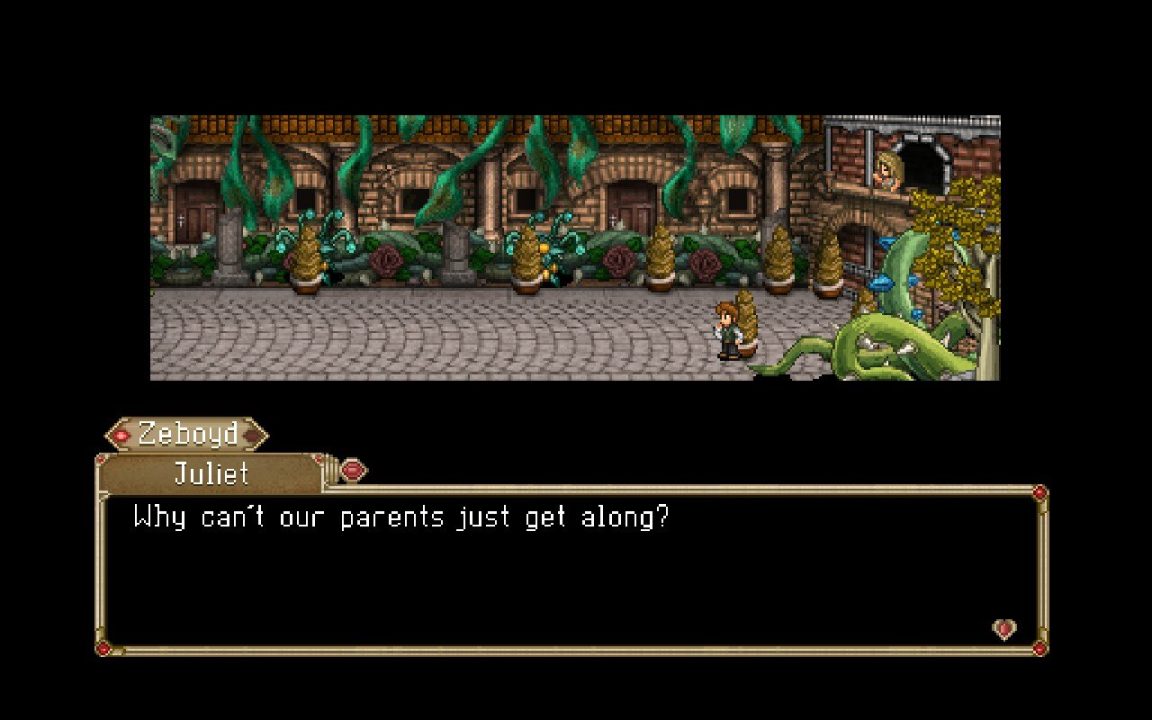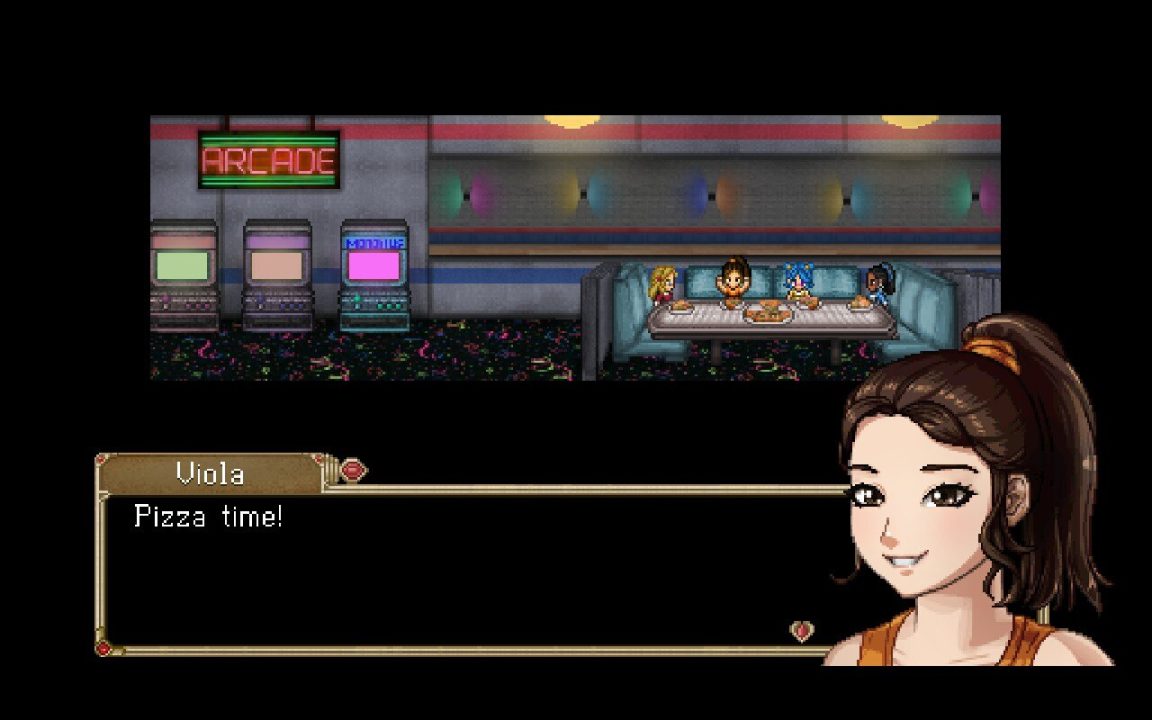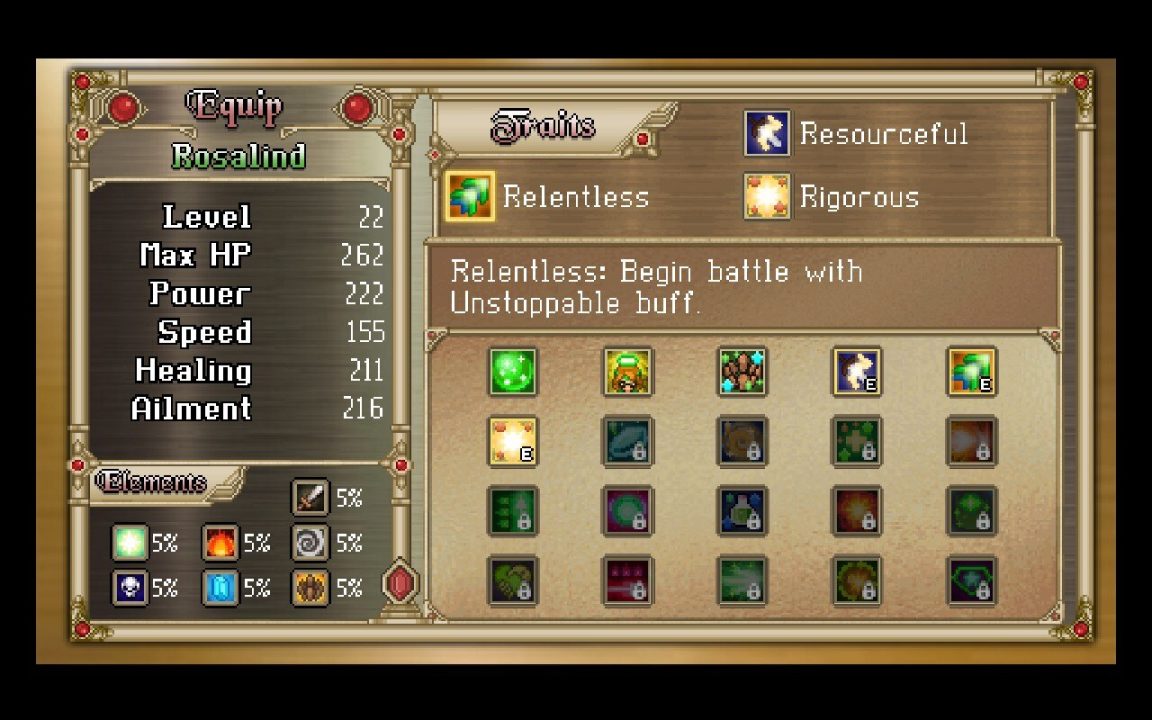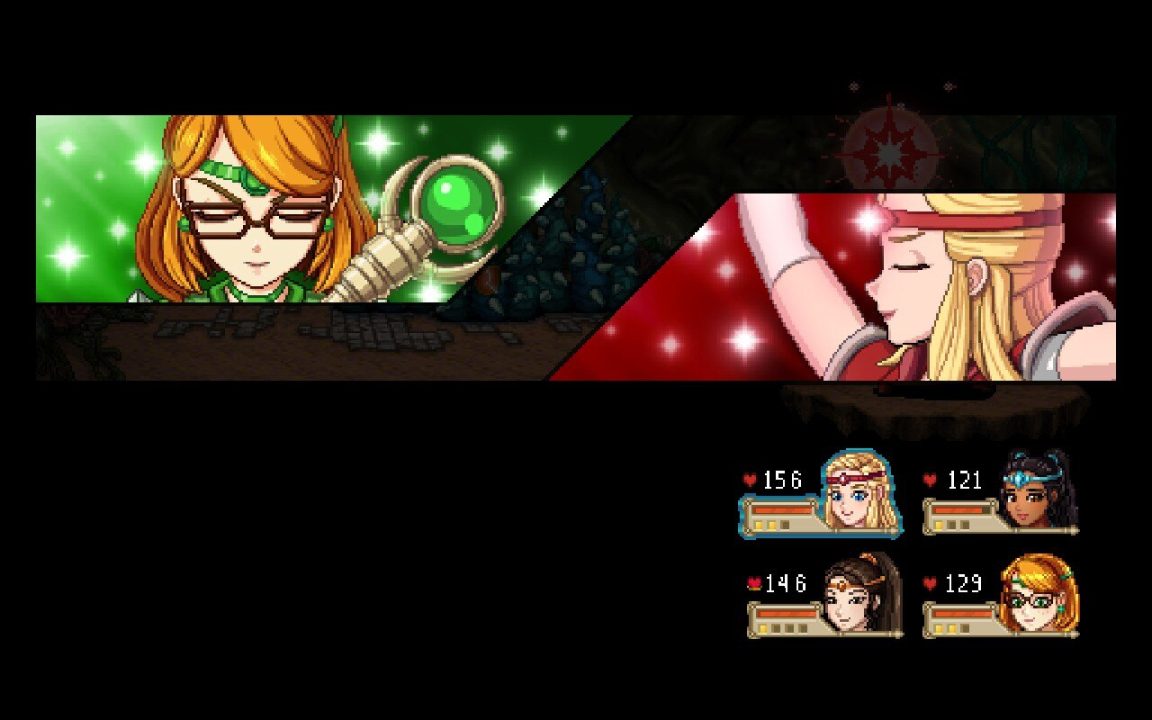Indie JRPGs that draw inspiration from the 16-bit classics of yore are all the rage these days, but the work of Zeboyd Games has always been a cut above the rest. The two-person team of Robert Boyd and William Stiernberg have created some wonderful RPGs in the past, including Breath of Death VII, Cthulhu Saves the World, and Cosmic Star Heroine. These games have cemented Zeboyd’s trademark style of games with relaxed pacing and light-hearted tones that lovingly poke fun at RPG tropes. Their latest project, This Way Madness Lies, might be Zeboyd’s most outlandish concept yet: a mashup of Shakespeare, Lovecraft, and the magical girl genre popularized by Sailor Moon. How does it compare? I’m pleased to report that This Way Madness Lies is an absolute delight, with gorgeous pixel graphics, an engaging combat system, and witty dialogue that makes my English major heart sing.
This Way Madness Lies follows the adventures of the Stratford-Upon-Avon High Drama Society, a group of theater students who, for reasons unknown, find themselves able to transform into magical girls and travel into alternate dimensions based on the plays of William Shakespeare. Unfortunately, these other worlds are under assault by a malefic force known as Nightmare, and it’s up to Imogen, Paulina, Rosalind, Miranda, Viola, Beatrice, and (eventually) Kate to put an end to the forces of evil before they spill over into reality. In between their superhero shenanigans, the septet will go ice-skating, have sleepovers, put on various plays for their community, and generally attempt to lead normal lives… or, at least as normal as they can be in a world where you can adopt a cat-dragon from your local pet store.

The story of This Way Madness Lies is somewhat slight and never takes itself too seriously, despite eventually rising into apocalyptic stakes. This is pretty par for the course for Zeboyd Games’ titles, and it’s especially fitting for a game aiming to be a send-up/homage to the magical girl genre. Thanks to how the game is structured, being split into short “acts,” it takes on an episodic feel akin to an anime series. In one act, the girls are trying to save Romeo and Juliet’s doomed romance from an onslaught of evil plant monsters, while in another, they’re sucked into a local arcade cabinet and forced to fight a program resembling Andross from Star Fox. The core cast is also extremely likable, with their personalities shining through their unique transformation animations and dialogue with the rest of the party. This Way Madness Lies even utilizes a system akin to Dragon Quest’s Party Talk feature, so you can always get the girls’ opinions on whatever bizarre circumstances they find themselves in. It’s great stuff.
Fans of the Bard will also get a lot out of This Way Madness Lies and its affectionate ribbing of some of the most famous works of English literature. One of the game’s features is its Ye Olde English to New English translator feature, where at the touch of a button, you can switch between the old-timey Shakespearian dialogue and more modern lingo, with hilarious results. In addition, in between dungeon runs, you’ll answer Shakespeare trivia questions from a rotating assortment of substitute teachers, mimicking the classroom segments of the modern Persona games in the process. There’s no reward for answering the questions correctly, at least as far as I could tell, but it is a cute inclusion.

Gameplay-wise, This Way Madness Lies resembles a fairly standard JRPG. You’ll explore the game’s various dungeons from a top-down perspective that should look familiar to anyone who grew up on SNES/Genesis RPGs. These dungeons are easy to navigate and adhere to tried-and-true templates: there’s a snow dungeon, a forest dungeon, a gothic castle dungeon, all of the greats. There are occasionally small gimmicks that offer more interaction than simply navigating through winding corridors, such as lowering the water level to access new areas, but there’s nothing too complicated on display. Enemies are visible on the field as moving black blobs of evilness and can usually be avoided, with scant exception.
This Way Madness Lies truly shines in its combat and skill systems. You can have four of your squad of superheroines in your party at a time, although you’ll be locked into specific party combinations for a good chunk of the game. Combat is turn-based and generally fast-paced, with an emphasis on inflicting status ailments like Poison or Stun on enemies and hitting their elemental weaknesses. Enemies will gain resistance to status ailments after they recover from them, meaning you’ll need to reduce their “ailment HP” if you want to afflict them again.

You won’t be equipping weapons or armor: instead, each of the girls earn new skills and traits by leveling up, which you can then equip for use in battle. Skills are abilities usable in combat, and most are disabled after a single use. You’ll need to occasionally use the “Rest” command to recharge all of a character’s abilities, although given the speed at which you blast through standard battles, this rarely felt like a pace breaker. Meanwhile, traits are passive abilities that grant various bonuses or change how certain skills work. It’s worth experimenting with different combinations of skills and traits to see what works best for you. Items must also be equipped and are one-use only, although they don’t replenish until after battle. You start the game with only three item equip slots, but you’ll gain more by thoroughly exploring the game.
Each party member earns a Hyper Point on their turn, and once they’ve earned enough points, they enter Hyper Mode (eat your heart out, Pokémon Colosseum), where their skills change and take on new effects. You can also utilize devastating Unite Attacks, where two party members combine skills to unleash a powerful move. Your Unite Attacks build in power with each passing turn, eventually capping at 100% effectiveness after ten turns have passed. Since Hyper Mode further boosts your Unite ability effectiveness by 20%, there’s incentive to hold off on using your most potent abilities until later in the fight. Lastly, there’s Desperation Mode. Whenever a party member hits 0 HP (if they have a certain buff), their health will instead go into negative digits, and their damage output will be boosted by 50%. They only have a single turn to take advantage of this before being KO’d, so it’s up to you whether you’d prefer to unleash a powerful attack or heal up. Despite all of these mechanics, combat in This Way Madness Lies rarely feels bogged down or cumbersome, and is positively breezy compared to some of its contemporaries.

In fact, “breezy” is probably the best way to describe the game overall. The developers estimate that it will take the average player about 5-10 hours to complete, depending on which difficulty setting they choose (which can be changed at any time from the settings menu). You can also save at any time, which is always a plus. Zeboyd Games prides themselves on “pacing that doesn’t waste your time,” which is usually a blessing. The game moves along at a very fast clip: you’ll rarely be in the same environment for long, your squad of magical girls constantly gain new skills and traits, and the bite-sized episodes between the longer dungeons break up the flow a little bit. It would be nice if some of these minisodes (like the one inside the arcade cabinet) were a little more substantial, but I won’t begrudge the game for it. I do, however, wish it was possible to see which status ailments/buffs/debuffs your party is currently afflicted with in battle. Enemies have a clear indicator on their sprites whenever they’re afflicted with something, and it would be handy to keep track of that for my party. I also thought the ending was a tad abrupt, and there isn’t much in the way of replay value. Still, minor quibbles aside, This Way Madness Lies’ gameplay is rock solid.
Visually, This Way Madness Lies is an absolute treat. The environments are incredibly lush and detailed, as are its sprites. I’m especially fond of your party members’ detailed character portraits. The game also runs smoothly and shouldn’t be too taxing on your computer. I played the game on a Steam Deck and only encountered one or two instances where the game stuttered for a second, but it never affected gameplay. The music in this game is also absolutely sublime. Joshua and Sarah Queen of the group DROiDS are behind the game’s sound, with Sarah singing in the numerous vocal themes. Sarah Queen and Riley Queen also provide the digitized voice acting samples heard in combat, which are charming in their own right. On an audiovisual level, This Way Madness Lies doesn’t disappoint.
Overall, I really enjoyed my time with This Way Madness Lies, so much so that I could cry, “good night, good night! Parting is such sweet sorrow.” Fans of William Shakespeare, Sailor Moon, or Zeboyd’s other titles will have an absolutely delightful time with this one, as will those who enjoy tinkering with skill systems in their RPGs. If you’re in the mood for a short JRPG with a great sense of humor, look no further.



